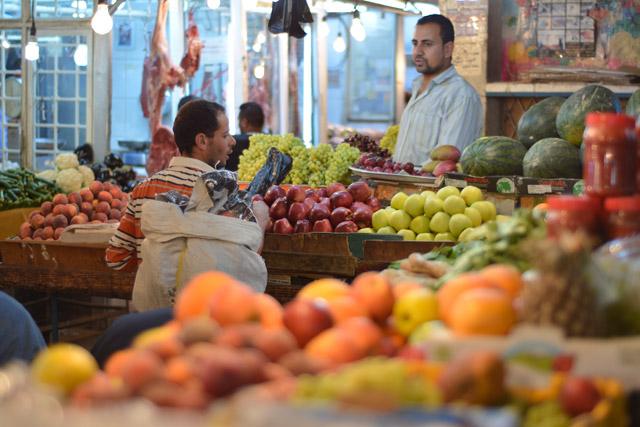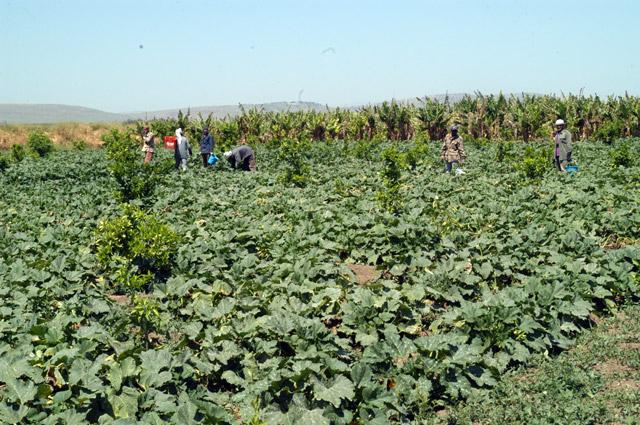You are here
Private sector labs to begin testing fruits, vegetables for pesticide residues
By Hana Namrouqa - May 01,2017 - Last updated at May 01,2017
AMMAN — Private sector laboratories will soon begin assisting authorities in the testing of fruits and vegetables for pesticide residues, a government official said on Monday.
The new step is part of the Agriculture Ministry’s response to the United Arab Emirates’ (UAE) ban on Jordanian exports of vegetables, according to ministry spokesperson Nimer Haddadin.
“The ban includes vegetables from Jordan, as well as other countries..., it hasn’t entered into force yet and every country is subject to its own criteria,” Haddadin told The Jordan Times, adding that “the ministry seeks to address the issue of pesticides’ residues”.
Representatives of private laboratories, as well as the Royal Scientific Society, on Monday met with Minister of Agriculture Khaled Hneifat, Haddadin said, indicating that the ministry seeks to increase the number of fruits and vegetables samples which will be tested, whether they are destined for local or foreign markets.
“A memorandum of understanding is due to be signed soon with the private sector’s laboratories and farmers, under which private labs will offer their testing services to the farmers at reasonable prices,” he noted.
Also on Monday, representatives from the agriculture sector met with the minister, who indicated that the ministry is planning to open its laboratories around the clock to test the quality of produce.
“The ministry is reviewing the pesticides which are currently being used, in order to cancel the registration of the ones whose pre-harvest interval (PHI) greatly differs from one crop to another,” Haddadin noted.
PHI refers to the amount of number of days which must pass after a pesticide is applied before the crop is cut, according to web sources, which indicated that each crop protection product has its own PHI.
Jordan Valley Farmers Union President Adnan Khaddam underscored the high quality of Jordan’s fruit and vegetable exports, noting that several European countries, with strict standards, import the country’s produce daily.
“The issue is not about using dangerous chemical pesticides. It is about a commitment to harvesting crops after the waiting period, when most of the pesticide applied to a crop is gone,” Khaddam told The Jordan Times.
The UAE’s ministry of climate change and environment last week announced a decision to ban the import of seven of Jordan’s main vegetable exports as of mid-May. The ban was put in place due to apparent increases in the levels of chemical pesticide residues in Jordan’s agricultural products, with all types of zucchini, sweet pepper, eggplant, cabbage, green beans, cauliflower and lettuce to be included in the ban.
The UAE’s decision also stipulated that imports of any fruits and vegetables, besides the aforementioned, be coupled with certificates from the Jordanian Ministry of Agriculture indicating that the produce was free from pesticide remnants.
The UAE’s Ambassador to Jordan Bilal Al Budoor said recently that the decision will go into force in the middle of this month if exporters fail to heed the agreements.
Several other Gulf countries, including Oman and Kuwait, are also reportedly applying stricter testing measures on the imports of vegetables, with Haddadin noting that despite the fact that “… they are testing the country’s vegetables at the borders, […] all shipments are being allowed entry and there are no troubles”.
Related Articles
AMMAN — Jordanian exporters of agricultural produce have stopped exporting several types of vegetables to the United Arab Emirates and other
AMMAN — Farmers and exporters on Sunday urged the Gulf countries which imposed a ban on the imports of Jordanian vegetables to delay the sta
AMMAN — Minister of Agriculture Khaled Hneifat and United Arab Emirates Ambassador to Amman Bilal Al Budoor are scheduled to meet on Tuesday
















